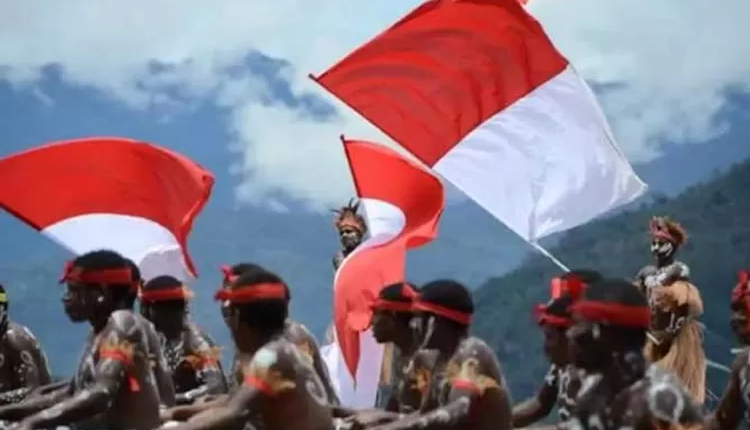Development of All Corners of Papua Requires the Role of Indigenous Communities
By: Lukas Wanimbo )*
Development in Bumi Cenderawasih requires active participation from indigenous communities to ensure the sustainability and success of every program implemented. The involvement of indigenous communities is not just a formality, but a necessity to achieve inclusive and sustainable development goals.
Indigenous communities, with their diverse cultures and local knowledge, have a strategic role in the development process of the region known as the Little Heaven that Fell to Earth.
Irene Manibuy, Chair of the West Papua Special Autonomy Development Acceleration Steering Committee (BP3OKP), emphasized the importance of the role of indigenous communities in contributing ideas for the sustainability of West Papua towards Papua Emas 2041.
So far, the distribution of special autonomy funds (otsus) has been carried out without clear planning, so it has the potential to ignore the aspirations of the community. Now, with a better planning mechanism and supervision, development should be carried out based on the wishes of the community. Community involvement in formulating ideas and input is very important so that the development carried out is in accordance with their needs and expectations.
The importance of strengthening the role of indigenous peoples in development was also expressed by Andi Sastra Beni Saragih, founder of Bicara Foundation West Papua. He considered indigenous peoples to play a role as social entities that have a strategic position in development.
Local governments must involve indigenous legal community groups in every inclusive and sustainable development agenda. The aspirations of indigenous legal communities need to be accommodated to ensure that development programs prioritize local wisdom values.
Thus, customary law communities can function as the vanguard in maintaining the sustainability of natural resources amidst the booming government infrastructure projects.
The presence of indigenous peoples in the decision-making process has a significant impact on environmental sustainability and the welfare of local communities. Indigenous peoples have in-depth knowledge of environmental conditions and sustainable ways of utilizing natural resources. Their involvement in every stage of project planning and implementation will help ensure that existing resources are managed properly and do not damage the environment.
Acting Governor of Papua, Ramses Limbong, emphasized the need to strengthen local wisdom and culture-based development in Papua. He reminded that development must not ignore the rights of indigenous peoples.
Culture and local wisdom are integral parts of Papuan identity, and preserving both must be a priority in every step of development. In this context, the government needs to ensure that every program implemented is not only economically beneficial, but also respects the rights and values held by indigenous peoples.
The involvement of indigenous peoples in development can also strengthen social relations and strengthen cultural identity. In every development process, there is a risk of conflict between economic interests and cultural preservation.
Therefore, it is important for the government and related parties to listen to the voices of indigenous peoples and respect their traditions and customs. Thus, the development carried out will be more acceptable to the community and reduce the potential for conflict.
Successful development is not only seen from the physical and material aspects, but also from how the community is actively involved in every process. The involvement of indigenous communities is a reminder that development should be carried out with an approach that respects and involves all affected parties. Through constructive dialogue, the government and community can collaborate to formulate more effective policies and programs.
The involvement of indigenous peoples in development also opens up space for innovation and creativity. Local knowledge held by indigenous peoples can provide more appropriate solutions that are in accordance with local conditions.
Local initiatives in natural resource management and infrastructure development can be concrete examples of how indigenous communities can contribute to achieving sustainable development goals.
Finally, the synergy between the government and indigenous peoples will result in more inclusive development that is responsive to the needs of the community. Indigenous peoples are not just beneficiaries, but also key actors who can determine the direction and form of development in the region nicknamed the Little Heaven at the tip of Indonesia. Therefore, involving them in every stage of development is a wise step to achieve a more prosperous and sustainable Papua.
Development in Papua, which involves the participation of indigenous peoples, also has the potential to create social justice. By involving all elements of society, including indigenous peoples, development can provide more equitable and fair benefits to all levels of society. This will strengthen social cohesion and build a sense of ownership among the community towards the development programs being implemented.
Overall, the success of development in Bumi Cenderawasih is highly dependent on the commitment of all parties, especially in involving indigenous communities. By combining traditional knowledge and modern technology, indigenous communities can help maintain biodiversity while strengthening the local economy. Therefore, making indigenous communities strategic partners in development is not only beneficial for them, but also for a better future for Papua.
)* Senior Researcher on Papuan Issues – Independent Papuan Institute for Social and Political Studies
